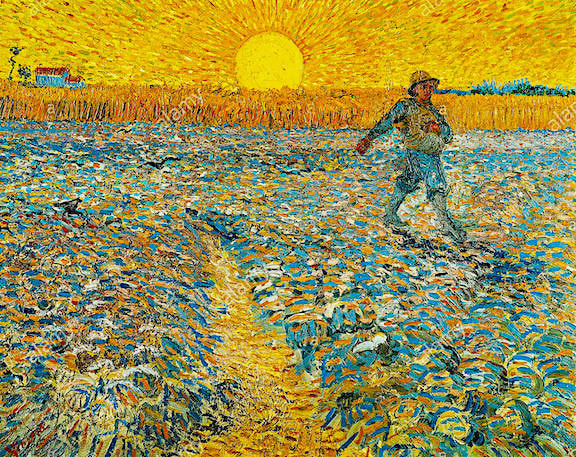
On this occasion Jesus crosses over from Gentile territory where he has healed the so-called Gerasene demoniac, back to a Jewish area – a risky choice, though at this stage the crowds are more of fan mob than a lynch mob. Here Jairus, the leader of the synagogue falls at Jesus’s feet, begging for the life of his daughter. Now this is a big deal. Jairus was important, honoured – and he crosses from that powerful place, demeaning himself at the dirty feet of a ragged itinerant and highly dodgy preacher. He crosses over from the centre to the edge. Why? because his daughter – according to Luke’s account his twelve-year-old daughter, on the border of childhood and womanhood – is in the border land between life and death. Are you noticing all the borders and edges? There are more to come.
Jesus goes with Jairus – of course! If the leader needs you, you drop everything and go, right ?– especially if it’s a life and death issue? But then there’s an interruption. The crowd is pressing close – no social distancing here, no boundary! And suddenly Jesus stops. He starts talking about someone having touched him and looking all around the crowd. Can you imagine that? No wonder the disciples are so confused. The leader’s daughter is dying, and he is worried about someone in a crowd bumping up against him!
But of course, there was no accidental bump here. The touch was deliberate. Across all the borders of exclusion, gender, isolation, the woman who has been bleeding for twelve years reached out to touch another edge – the hem of Jesus’ garment. And it was enough. Her touch was forbidden on so many levels. Because of her bleeding, the woman would have been excluded from society, from religious ceremony, from every aspect of daily life for twelve years – all the years Jairus’ daughter has been alive in fact. Stuck on the edge of menopause, just as the girl is stuck on the edge of puberty, she dares to cross over – to be out in public, to touch a man, or at least his clothing, to make a bid for her life. And Jesus asks for more. By stopping, by acknowledging what has happened, he invites her to come across the border, from the edge to the very centre – to come and speak her whole truth.
But while all this is going on, while Jesus has been ‘wasting time’, Jairus’ daughter dies, and word comes from the household not to trouble Jesus further. And watch the movement here – Jesus brought the woman from the edge, right into the thick of the crowd. But when it comes to the little girl, he allows no one to accompany him except his closest disciples and the child’s parents. Just as the excluded person needs to be brought from the edge to the centre to find wholeness, so the child whose parent is the ‘big shot’ needs to be taken to a quiet edge, away from others, there to be taken by the hand and receive the simplest of words in Aramaic, ‘ Talitha cum’, ‘little girl, get up’. (I love those two words, along with the one other word in Aramaic in the gospels, spoken to the deaf man, ‘"ephphatha," as being perhaps some of the only words in Scripture we can reasonably assume that Jesus pronounced – praying with them has a special resonance for me). Taking the child by the hand was of course forbidden – to touch the dead made Jesus ritually unclean. Yet he crosses over the border to bring her back, to invite her to cross the threshold into womanhood.
Two women – two stories of crossing over and restoration to life – mirror stories that take us from the edge to the centre and back again. Don’t worry too much about the miraculous. Just notice the edges, the borderlands, the crossings, the risks, that are part of every human story of identity and transformation. For this story is of course also our story. This is who we are and just as the woman and the girl in these nested stories are restored to their true and emerging identities, so this story invites us to live out our identity; to risk the crossings, to inhabit the borders where wholeness happens.
And not just at the individual level. For Pitt St is a borderland community – and I don’t just mean that we come from many different LGAs! We could easily take attraversiamo as our motto, as we cross borders of geography, religious belief, ableism, gender, sexuality, race and all the rest on a daily basis. So have a little think about the borders you have crossed in life; about the borderlands you have chosen or been forced to inhabit; and about the healing that unexpectedly you have found there. And let’s chat about some of that and Pitt Street’s calling over our tea and coffee later – but for now, ‘let’s cross over’ as we move to our affirmation of faith. Amen.
by Penny Jones, for Pitt Street Uniting Church, Sunday 27 June 2021

 RSS Feed
RSS Feed